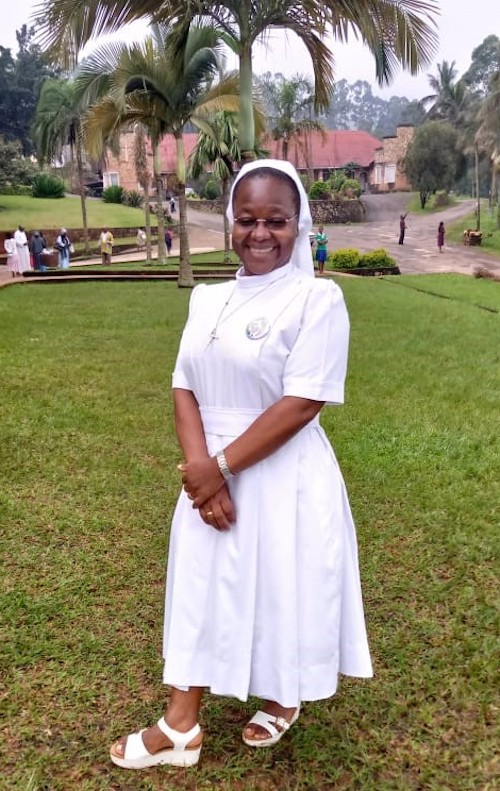
Sr. Louisa Abid of the Sisters of St. Therese of the Child Jesus of Buea, Cameroon (Provided photo)
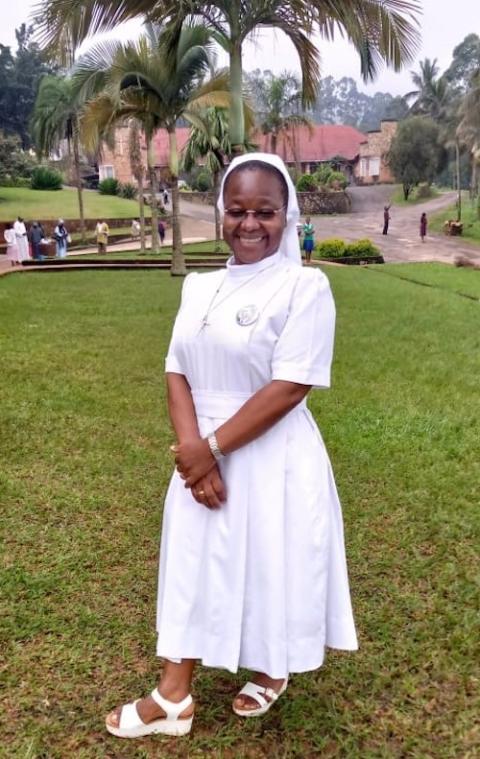
Sr. Louisa Abid of the Sisters of St. Therese of the Child Jesus of Buea, Cameroon (Provided photo)
Sr. Louisa Abid is a Sister of St. Therese of the Child Jesus of Buea, Cameroon. She is a registered nurse with a master's degree in public health and a diploma in health care administration.
GSR: Sister Louisa, thank you for taking time to share with us the impact of war and now COVID-19 on your work in public health. How long have you been the health coordinator for the Bamenda Archdiocese?
Abid: I have been the health coordinator for the Archdiocese and the Ecclesiastical Province of Bamenda for three years. The 25 facilities include five hospitals, 11 medical centers and six primary health centers.
That is a big responsibility. How did you happen to take on this ministry?
I was working as a nurse and realized that the health centers were becoming dysfunctional, and having a degree in public health, I thought I could contribute to improving the system. I was excited when my superior general and the bishops of the province decided to appoint me to this position. I found my appointment an opportunity to impact quality health care delivery, especially in remote areas, and accepted the challenge.
You have a diploma in health care administration. What started you on that path and responsibilities?
Having gone through the African Sisters Education Collaborative's Sisters Leadership Development Initiative program, I was confident I had the capacity to be an effective servant leader. My experience of hospital management for eight years gave me the ability to mentor and coach other health care managers. Most health care managers learn on the job and need supportive supervision.
My responsibility as a diocesan health coordinator is to liaise between the health services ministry and the bishops; attend meetings at national, regional, diocesan and government levels; supervise health facilities; collect and analyze data; organize training seminars; form health committees and commissions; order and disburse pharmaceuticals; recruit personnel; write, implement and report on projects; and propose initiating new health facilities.
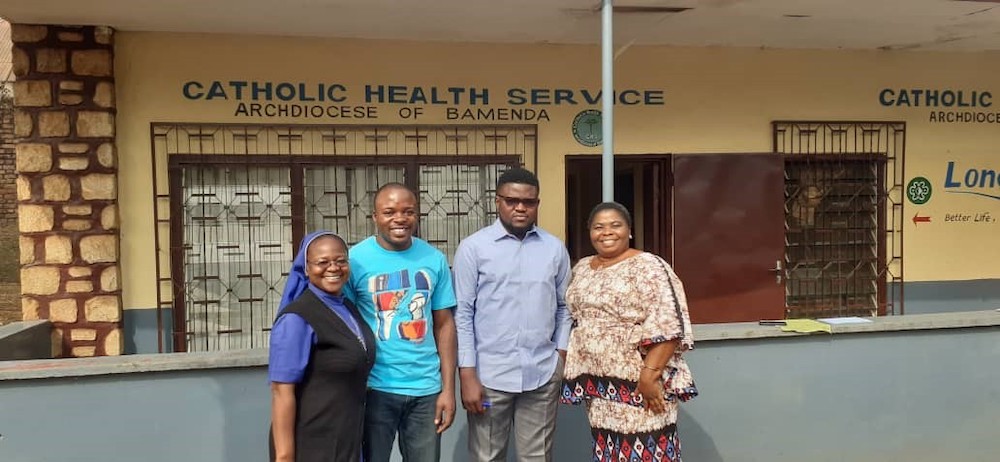
The health coordination team for the Archdiocese of Bamenda, Cameroon. From left: Sr. Louisa Abid, health coordinator; Kwa Joseph, laboratory technician; Dr. Fotabong Rene, pharmacist; and Nya Seraphica (Provided photo)
What sorts of training seminars do you design?
The main reason the church runs health facilities is to continue Christ's healing mission, so it is my responsibility to make sure the mission provides quality health care. Seminars are important to keep personnel updated in their services and to supervise the ministry. I have help from a health coordination team, a pharmacist laboratory technician and an accountant.
I imagine the government also has requirements that the health ministry must follow.
Yes, the Catholic Church is in partnership with the government to deliver health services, and we follow their regulations as well as the church's.
What do you like best in this work, and what are your greatest challenges?
I especially like that this work puts me at the learning corner every day because each day comes with unique experiences. Also, I enjoy seeing the health facilities grow, and the personnel, too.
The greatest challenge is funding. The only income for the health coordination office is annual dues from each health facility. These are minimal and never cover the costs. Another challenge is the constant change of health care managers of facilities owned by religious institutes. The consequence is lack of continuity and always having to start over with training. Added to this is high staff turnover because of the crisis in the country and also staff ambition. Lastly, facilities are owned by different congregations of sisters and are run differently, which makes harmonizing health delivery a big challenge.
Advertisement
Speaking of challenges, how does the war impact your work?
Since 2017, as a public health officer, internally displaced people actually caught my attention and has become a big part of my work. I have a lot of passion for the children and pregnant adolescent girls. They all need health care, food, shelter and clothing. Seeing their suffering, I started seeking assistance through my office.
How has the search gone?
Our first donor was Medicines for Humanity, who helped us provide free antenatal consultations and delivery kits from a mobile clinic. Doctors Without Borders helped us with free consultations, surgical interventions and ambulance service. The United Nations Population Fund helped us deliver 500 mama kits for emergency delivery needs, which we shared with other archdiocesan facilities.
Our attention was diverted a lot from regular health care to victims of war. Roadblocks kept us from monthly facility supervisions, training seminars and disbursing of medicines. We even closed down three facilities temporarily due to insecurity and have reopened one. We had lots of attacks on facilities for providing care to victims of war. A patient was even shot at one of them. Health personnel were kidnapped, and we had to pay ransom for release.
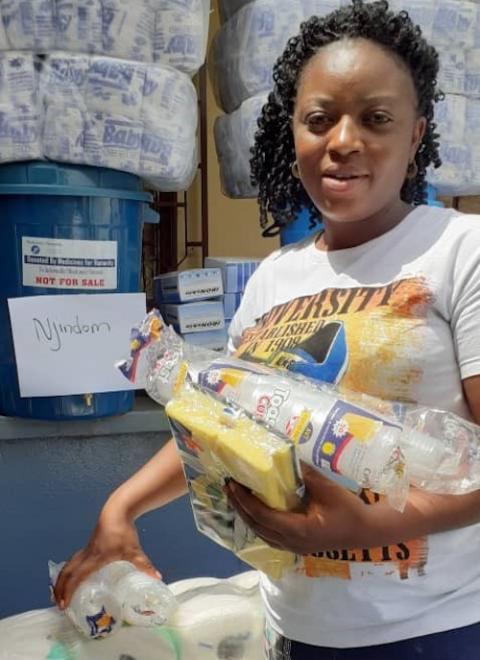
Lukong Mirabel, chief of the Our Lady of Lourdes Health Center in Nnjindom, Cameroon, prepares COVID-19 preventive and protective materials (Provided photo)
Our office driver, Fombu Elias, our longest serving staff member of 18 years, was shot and killed on Sept. 20, 2019. He left a wife and four young children. His death slowed down work, as finding a new driver was difficult.
We also faced challenges with the archdiocesan drug store, which is a revolving fund for medications to health facilities. It was hard to get quality medication and transport them to Bamenda.
How have families been affected by the war?
When the war started in November 2016, we thought it would be short, so we mobilized funds for food but began to realize it would not be short. Patients needing medical care started coming, particularly cases of rape and pregnant women and girls.
I remember Vero and her nine children, who lived in the forest for two months before they found their way to Bamenda. She and her baby came to me malnourished, so before listening to her medical need, I sent her to the canteen to eat.
She said: "On reaching Bamenda with my nine children, I had nowhere to live. I sent three of them to Douala to live with relatives, and a friend accommodated me and the others, who were all sick. I couldn't come here earlier because I had no money for a taxi, so I walked here alone."
We gave her taxi money to bring the children, some of whom were hospitalized. All got well, and we gave them food to take home.
Two women, Doris and Christabel, both 17, were pregnant by rape. The rapist of Christabel was the same person who killed her mother and uncle. We gave her shelter and food and prepared her for delivery of twins. She now has a small-scale business.
Struggling Women is a group of 35 who give me hope. They are all pregnant internally displaced people whom I invited to start a self-empowerment group. Some friends helped me raise some funds to start a savings and loan community. Each woman received 20,000 francs [$36.07] and management training. They meet every two weeks to evaluate their businesses and do savings and lending. My dream is to start more groups.
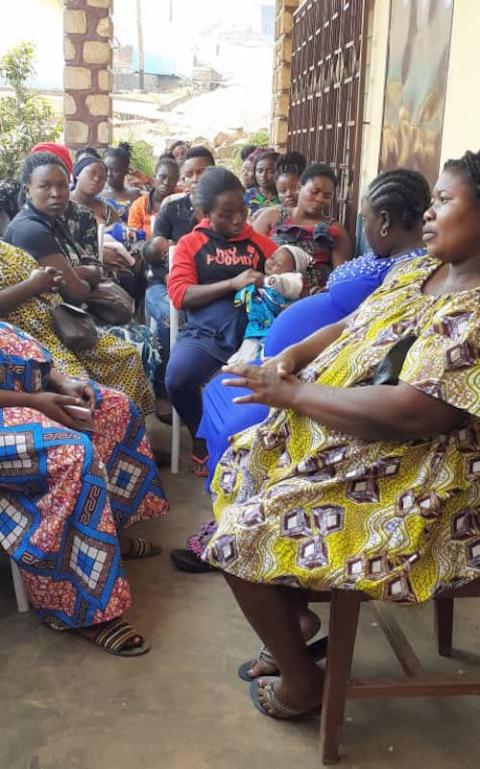
Struggling Women, a women's-empowerment group, during one of their meetings (Provided photo)
What about COVID-19? There must be more challenges.
The greatest challenge is limited infrastructure for our Catholic health facilities. We do not have personal protective materials for our staff. April began the increase of positive tests among staff because the government is unable to provide us with protective materials, and we cannot even purchase them because of high demand. Internet service is poor at most of the archdiocesan sites, so we cannot rely on internet for meetings or communication. We use the phone for emergency action.
Because people do not want to use the government facilities [because they do not follow the coronavirus guidelines and have poor service], they either go home or try us, so we have an overflow. All our hospitals in the town test for COVID-19 but are not treatment centers.
When someone tests positive, all we can do is give some treatments to take at home, but then the entire household of a one-room house for internally displaced people becomes contaminated.
Water is only available from community taps; there is little or no money for food because the food stalls for income are closed, and there is no space for gardens. For families of internally displaced people living in the forest, things are worse. Roadblocks prevent access to food and, often, water access. How can families in these situations respect 14 days of isolation? Impossible.
Many people still do not believe in the reality and danger of COVID, so there is need for education.
Is there any hope of the war ending?
The war started due to felt marginalization of the Anglophone part of the country, but to date, the issues have not been addressed; instead, more injury has been caused. I do not see it ending soon.
Louisa, as a leader, how do you cope knowing this?
It is very disturbing, the present uncertainty and instability in the Anglophone regions. However, I do believe that with God, everything is possible, and so I am very hopeful that peace and justice is restored soon.
There is a saying that difficulty draws people to God, and that is our reality. Many people now pray and long to have a good relationship with God and neighbor.
For myself, my source of strength is the Eucharist and my religious community. In the presence of the Blessed Sacrament daily, I pour unto the Lord all the pain, anger, bitterness, frustration that I carry from those I listened to daily. Sharing work experiences and praying together in community living relieves work stress. Days of recollection and periods of retreats give me opportunities to refill my energy and spirit so as to give positive energy to those who come to me.
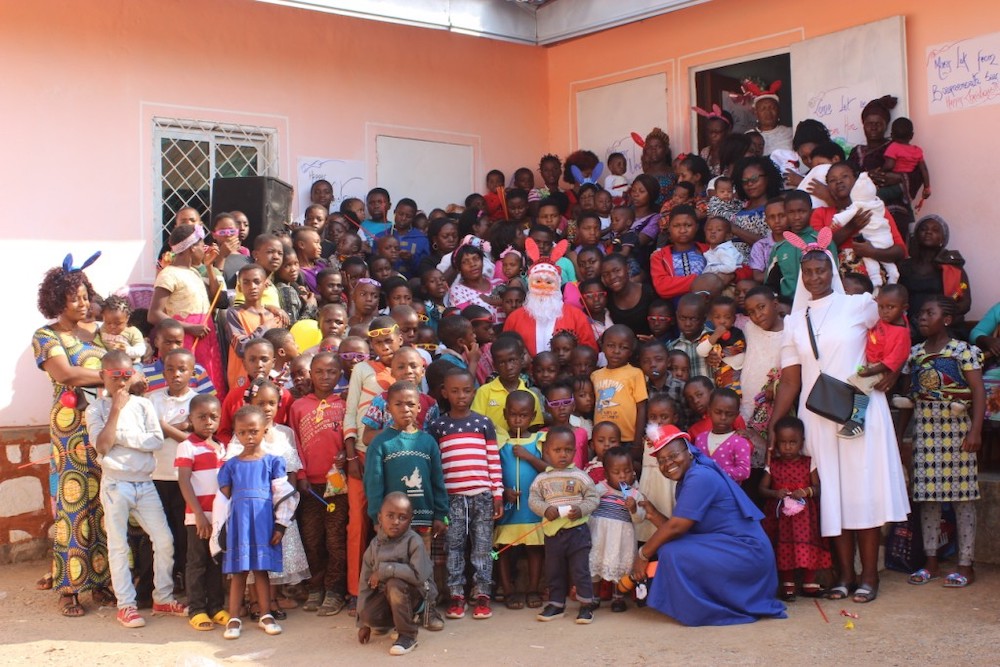
Sr. Louisa Abid spends Christmas 2019 with internally displaced children people and their children. (Provided photo)
[Joyce Meyer is a member of the Sisters of the Presentation of the Blessed Virgin Mary and is GSR's liaison to women religious outside of the United States.]







